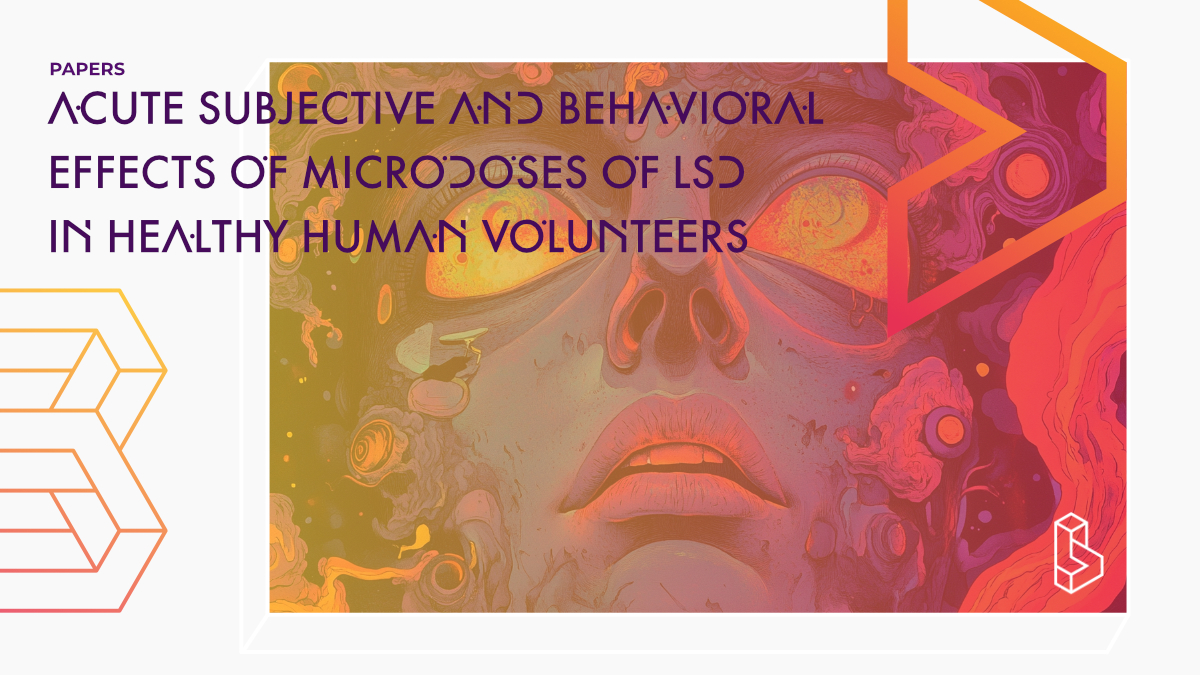This double-blind, placebo-controlled, within-subject study (n=20) found that a microdose of LSD (up to 26μg; 3x) elicited dose-dependent subjective effects during the ‘peak’ of the experience but not at the follow-up (48 hours).
Abstract of Acute Subjective and Behavioral Effects of Microdoses of LSD in Healthy Human Volunteers
“Background: Numerous anecdotal reports suggest that repeated use of very low doses of lysergic acid diethylamide (LSD), known as microdosing, improves mood and cognitive function. These effects are consistent both with the known actions of LSD on serotonin receptors and with limited evidence that higher doses of LSD (100–200 μg) positively bias emotion processing. Yet, the effects of such subthreshold doses of LSD have not been tested in a controlled laboratory setting. As a first step, we examined the effects of single, very low doses of LSD (0–26 μg) on mood and behaviour in healthy volunteers under double-blind conditions.
Methods: Healthy young adults (N = 20) attended 4 laboratory sessions during which they received 0 (placebo), 6.5, 13, or 26 μg of LSD in randomized order at 1-week intervals. During the expected peak drug effect, they completed mood questionnaires and behavioural tasks assessing emotion processing and cognition. Cardiovascular measures and body temperature were also assessed.
Results: LSD produced dose-related subjective effects across the 3 doses (6.5, 13, and 26 μg). At the highest dose, the drug also increased ratings of vigour and slightly decreased positivity ratings of images with positive emotional content. Other mood measures, cognition, and physiological measures were unaffected.
Conclusions: Single microdoses of LSD produced orderly dose-related subjective effects in healthy volunteers. These findings indicate that a threshold dose of 13 μg of LSD might be used safely in an investigation of repeated administrations. It remains to be determined whether the drug improves mood or cognition in individuals with symptoms of depression.”
Authors: Anya K. Bershad, Scott T. Schepers, Michael P. Bremmer, Royce Lee & Harriet de Wit
Notes on Acute Subjective and Behavioral Effects of Microdoses of LSD in Healthy Human Volunteers
This paper was included in a systematic review of microdosing psychedelics by Ona & Bouso (2020).
Summary of Acute Subjective and Behavioral Effects of Microdoses of LSD in Healthy Human Volunteers
Healthy young adults received 0 (placebo), 6.5, 13, or 26 mg of LSD in randomized order at 1-week intervals and completed mood questionnaires and behavioral tasks assessing emotion processing and cognition. Cardiovascular measures and body temperature were also assessed.
Microdosing lysergic acid diethylamide (LSD) to improve mood and cognitive function has received widespread coverage in the media. Although few controlled studies have been conducted, there have been several naturalistic studies.
LSD has been shown to have effects on the serotonin system, specifically the 5-HT2A receptors, although it also binds to several other serotonin receptors and dopamine D2 receptors. Its effects last for a long time, which may account for its therapeutic value.
Find this paper
https://doi.org/10.1016/j.biopsych.2019.05.019
Open Access | Google Scholar | Backup | 🕊
Cite this paper (APA)
Bershad, A. K., Schepers, S. T., Bremmer, M. P., Lee, R., & de Wit, H. (2019). Acute subjective and behavioral effects of microdoses of lysergic acid diethylamide in healthy human volunteers. Biological psychiatry, 86(10), 792-800.
Study details
Compounds studied
LSD
Topics studied
Microdosing
Study characteristics
Original
Placebo-Controlled
Double-Blind
Within-Subject
Randomized
Participants
20
Humans
Authors
Authors associated with this publication with profiles on Blossom
Harriet de WitHarriet de Wit is a Professor of Psychiatry and Behavioral Neuroscience at the University of Chicago. Her research focuses on the physiological, subjective (i.e., mood-altering), and behavioral effects of drugs in healthy human volunteers.
Institutes
Institutes associated with this publication
University of ChicagoResearch with psychedelics is taking place at the Human Behavioral Pharmacology Lab at the University of Chicago.
Compound Details
The psychedelics given at which dose and how many times
LSD 6.5 - 23μg | 3x
Linked Clinical Trial
Mood Effects of Serotonin AgonistsThe purpose of this study is to determine the effects of very low doses of serotonergic agonists on depressed mood in human volunteers.

